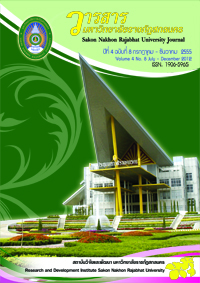พฤติกรรมการตั้งใจเรียนของนักศึกษาระดับปริญญาตรี ภาคพิเศษ มหาวิทยาลัยราชภัฏราชนครินทร์
Keywords:
พฤติกรรมการตั้งใจเรียน, Attentive behaviorAbstract
บทคัดย่อ
การวิจัยครั้งนี้มีจุดมุ่งหมายเพื่อเปรียบเทียบ ศึกษาความสัมพันธ์ และค้นหาตัวแปรทำนายพฤติกรรมการตั้งใจเรียนของนักศึกษาภาคพิเศษมหาวิทยาลัยราชภัฏราชนครินทร์ โดยใช้ตัวแปรจิตลักษณะเดิม ตัวแปรสถานการณ์ และตัวแปรจิตลักษณะตามสถานการณ์ในกลุ่มรวมและเมื่อจำแนกตาม เพศ สถานภาพสมรส เกรดเฉลี่ยสะสม และระดับรายได้ กลุ่มตัวอย่างเป็นนักศึกษาระดับปริญญาตรีภาคพิเศษ มหาวิทยาลัยราชภัฏราชนครินทร์ จำนวน 396 คน ใช้วิธีการสุ่มแบบชั้นภูมิ สถิติที่ใช้วิเคราะห์ข้อมูลได้แก่ ค่าเฉลี่ย การวิเคราะห์ความแปรปรวนทางเดียว การทดสอบค่าสัมประสิทธิ์สหสัมพันธ์ของเพียร์สันและการวิเคราะห์ถดถอยพหุคูณ ผลการวิจัยพบว่านักศึกษาที่มีคู่มีพฤติกรรมการตั้งใจเรียนสูงกว่านักศึกษาที่ไม่มีคู่ นักศึกษาที่มีระดับรายได้สูงมีพฤติกรรมการตั้งใจเรียนสูงกว่านักศึกษาที่มีรายได้ต่ำ นักศึกษาที่มีเกรดเฉลี่ยสะสมมากมีพฤติกรรมการตั้งใจเรียนสูงกว่านักศึกษาที่มีเกรดเฉลี่ยสะสม ตัวแปรจิตลักษณะเดิม ตัวแปรสถานการณ์ และตัวแปรจิตลักษณะตามสถานการณ์สามารถทำนายพฤติกรรมการตั้งใจเรียนได้ร้อยละ 39.3 โดยตัวแปรที่สามารถทำนายพฤติกรรมการตั้งใจเรียนได้อย่างมีนัยสำคัญทางสถิติ ได้แก่ แรงจูงใจใฝ่สัมฤทธิ์ ลักษณะมุ่งอนาคตและการควบคุมตน การรับรู้พฤติกรรมการสอนของอาจารย์ และการสนับสนุนของครอบครัว ตามลำดับ
คำสำคัญ : พฤติกรรมการตั้งใจเรียน
Abstract
This comparative-correlative study aimed to examine the predictive variables that could identify the attentive behavior of part-time undergraduate students at Rajanagarindra Rajabhat University; focusing on three independent variables namely: psychological; situational; and psychological-situational characteristics; in relation to the participants’ gender; marital status; grade point average; and income level. The participants in the study were 396 part-time undergraduate students of Rajanagarindra Rajabhat University; randomly selected via the stratified random sampling method. One-way ANOVA; t-test; Pearson’s product moment correlation coefficient; and multiple regression analysis were used to analyze the data. Results of study were as follows: 1) Participants with a partner were found to be significantly more attentive than participants without a partner. 2) Participants with higher income were found to be significantly more attentive than those with lower income. 3) Participants with a higher grade point average were found to be significantly more attentive than those with a lower grade point average. 4) Psychological characteristics; situational characteristics; and psychological-situational characteristics in combination were found to predict 39.3% of the participants’ attentive behavior; with achievement motivation as the strongest predictor; followed by future orientation and self-control; perceived teacher’s behavior; and family support; respectively.
Keyword : Attentive behavior









